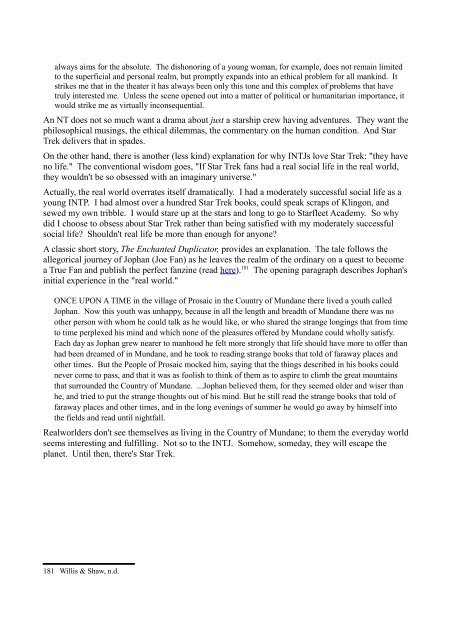You also want an ePaper? Increase the reach of your titles
YUMPU automatically turns print PDFs into web optimized ePapers that Google loves.
always aims for the absolute. The dishonoring of a young woman, for example, does not remain limited<br />
to the superficial and personal realm, but promptly expands into an ethical problem for all mankind. It<br />
strikes me that in the theater it has always been only this tone and this complex of problems that have<br />
truly interested me. Unless the scene opened out into a matter of political or humanitarian importance, it<br />
would strike me as virtually inconsequential.<br />
An NT does not so much want a drama about just a starship crew having adventures. They want the<br />
philosophical musings, the ethical dilemmas, the commentary on the human condition. And Star<br />
Trek delivers that in spades.<br />
On the other hand, there is another (less kind) explanation for why INTJs love Star Trek: "they have<br />
no life." The conventional wisdom goes, "If Star Trek fans had a real social life in the real world,<br />
they wouldn't be so obsessed with an imaginary universe."<br />
Actually, the real world overrates itself dramatically. I had a moderately successful social life as a<br />
young INTP. I had almost over a hundred Star Trek books, could speak scraps of Klingon, and<br />
sewed my own tribble. I would stare up at the stars and long to go to Starfleet Academy. So why<br />
did I choose to obsess about Star Trek rather than being satisfied with my moderately successful<br />
social life? Shouldn't real life be more than enough for anyone?<br />
A classic short story, The Enchanted Duplicator, provides an explanation. The tale follows the<br />
allegorical journey of Jophan (Joe Fan) as he leaves the realm of the ordinary on a quest to become<br />
a True Fan and publish the perfect fanzine (read here). 181 The opening paragraph describes Jophan's<br />
initial experience in the "real world."<br />
ONCE UPON A TIME in the village of Prosaic in the Country of Mundane there lived a youth called<br />
Jophan. Now this youth was unhappy, because in all the length and breadth of Mundane there was no<br />
other person with whom he could talk as he would like, or who shared the strange longings that from time<br />
to time perplexed his mind and which none of the pleasures offered by Mundane could wholly satisfy.<br />
Each day as Jophan grew nearer to manhood he felt more strongly that life should have more to offer than<br />
had been dreamed of in Mundane, and he took to reading strange books that told of faraway places and<br />
other times. But the People of Prosaic mocked him, saying that the things described in his books could<br />
never come to pass, and that it was as foolish to think of them as to aspire to climb the great mountains<br />
that surrounded the Country of Mundane. ...Jophan believed them, for they seemed older and wiser than<br />
he, and tried to put the strange thoughts out of his mind. But he still read the strange books that told of<br />
faraway places and other times, and in the long evenings of summer he would go away by himself into<br />
the fields and read until nightfall.<br />
Realworlders don't see themselves as living in the Country of Mundane; to them the everyday world<br />
seems interesting and fulfilling. Not so to the INTJ. Somehow, someday, they will escape the<br />
planet. Until then, there's Star Trek.<br />
181 Willis & Shaw, n.d.




